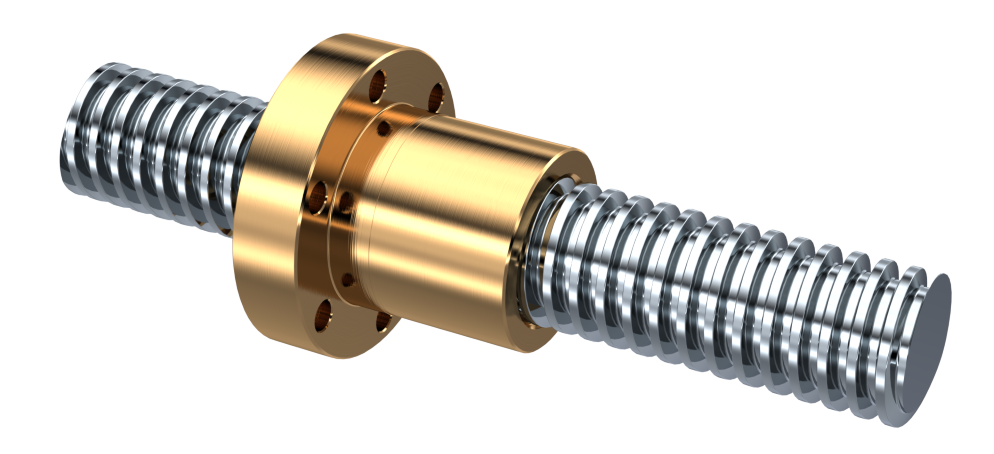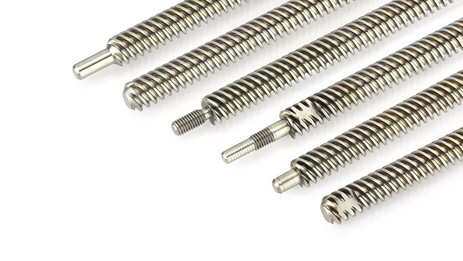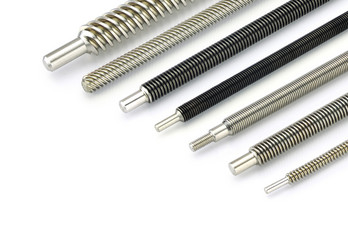Product Description
BSH small lead ball screw for automatic machine:
Ball screw assembly consists of screw, nut, end support unit and coupling, the function is to convert rotary motion into linear motion, or convert linear motion into rotary motion. Because of the high stiffness and accuracy, ball screw is widely used for all kinds of industrial equipments and precise instruments.
| Product | ball screw |
| Model | BSH |
| Dia | 8, 10, 12, 14, 16,20,25mm |
| Lead | 2, 2.5, 4, 5, 10mm |
| Accuracy | C7 (0.05/E300mm), C5 (0.571/E300mm) |
| Nut style | single |
| End pocessing | according to customer’s drawing |
| Delivery time | 5~7 days for sample, 15~30 days for the bulk |
Application:
1. Automatic controlling machine
2. Semi-conductor industry
3. General industry machinery
4. Medical equipment
5. Solar energy equipment
6. Machine tool
7. Parking system
8. High-speed rail and aviation transportation equipment, etc.
Model list:
Detailed pictures:
Company information
TOCO Group is a professional manufacturer in linear motion components in China, mastering critical core technology, focusing on research and innovative design.It has a number of product design patents and with ISO9001 certification, who is named a national high-tech enterprise.At present, there are 2 major production factories with a total area of 13,000 square meters.Thanks to a strong technical and production team, CHINAMFG can quickly provide high-performance and high-quality transmission components for global customers, which has been widely recognized by domestic and foreign customers.
TOCO MOTION brand product line is complete, the main products are: Mono stage, linear module, linear guide, Ball screw, Support unit, Rack and Pinion.The products are widely used in: 1. Automation equipment 2. Display and semiconductor equipment 3. Woodworking equipment 4. Medical equipment 5. Photovoltaic and new energy equipment 6. Laser equipment 7. Machine tool equipment 8. Equipment in the fields of aerospace and rail transit, etc.
TOCO products are exported to more than a dozen countries and regions overseas.
FAQ
1. Service :
a. Help customer to choose correct model
b. Professional sales team, make your purchase smooth.
2.payment :
Sample order: We require 100% T/T in advance. sample express need request pay by clients
Bulk order: 30% T/T in advance, balance by T/T against copy of B/L.
T/T,Paypal, Western Union is acceptable.
3.Package & Shipping :
a.Package: Carton or wooden case.
b.Shipping: by express (DHL, TNT, FedEx, etc.) or by sea
4.Delievery :
sample: 5-10 business days after payment confirmed.
Bulk order :10-20 workdays after deposit received .
5. Guarantee time
CHINAMFG provides 1 year quality guarantee for the products from your purchase date, except the artificial damage.
6.After sale-service
During warranty period, any quality problem of CHINAMFG product, once confirmed, we will send a new 1 to replace.
/* January 22, 2571 19:08:37 */!function(){function s(e,r){var a,o={};try{e&&e.split(“,”).forEach(function(e,t){e&&(a=e.match(/(.*?):(.*)$/))&&1
| Precision: | C5 |
|---|---|
| Flange: | Without Flange |
| Nut Number: | Single |
| Rows Number: | 4-Row |
| Nut Type: | Circulator |
| Type: | Inner Loop |
| Samples: |
US$ 10/Piece
1 Piece(Min.Order) | |
|---|
| Customization: |
Available
|
|
|---|

Can you provide examples of products or machinery that use lead screws for precise positioning?
Lead screws are widely utilized in various products and machinery that require precise positioning. Here are some examples of products and machinery that commonly use lead screws for precise positioning:
- CNC Machines: Computer numerical control (CNC) machines, including CNC mills, lathes, and routers, use lead screws to precisely position the cutting tools or workpieces. Lead screws enable accurate and repeatable movement in the linear motion systems of these machines, allowing for precise machining operations.
- 3D Printers: Lead screws are extensively used in 3D printers to control the movement of the print head or build platform. They enable precise positioning of the print head, ensuring accurate layer-by-layer deposition of the printing material, resulting in high-quality 3D prints.
- Robotics: Lead screws are integral to robotic systems that require precise positioning. They are used in robotic arms to control the movement and positioning of the end effectors or grippers. Lead screws provide accurate and controlled linear motion in robot joints, allowing for precise and coordinated movements in industrial, medical, and research robotics.
- Medical Imaging Systems: Lead screws are employed in medical imaging systems, such as computed tomography (CT) scanners and magnetic resonance imaging (MRI) machines, to precisely position the patient bed or gantry. This precise positioning is crucial for accurate imaging and diagnosis.
- Laboratory Automation Equipment: Lead screws are used in laboratory automation equipment, such as liquid handling robots and sample handling systems, for precise positioning and movement of samples, reagents, and labware. They ensure accurate and repeatable positioning required for various laboratory processes.
- Semiconductor Manufacturing Equipment: Lead screws are utilized in semiconductor manufacturing equipment, including wafer handling systems and lithography machines. They provide precise positioning and movement of wafers, masks, and other components critical for semiconductor fabrication processes.
- Camera Sliders: Lead screws are employed in camera sliders used in photography and videography applications. They enable smooth and precise linear motion of the camera along the slider, allowing for controlled tracking shots and precise camera positioning.
- Telescopes and Astronomy Equipment: Lead screws are utilized in telescopes and other astronomy equipment to precisely position optical components and achieve accurate tracking of celestial objects. They enable fine adjustments and precise pointing of telescopes for astronomical observations.
- Industrial Inspection Systems: Lead screws are used in industrial inspection systems, such as coordinate measuring machines (CMMs) and optical inspection systems, for precise movement and positioning of the inspection probes or cameras. This ensures accurate measurement and inspection of manufactured components.
These are just a few examples of the products and machinery that utilize lead screws for precise positioning. The versatility, accuracy, and reliability of lead screws make them a preferred choice in applications that require controlled linear motion and precise positioning of components.

How does the choice of lead screws affect the overall performance and reliability of linear motion systems?
The choice of lead screws has a significant impact on the overall performance and reliability of linear motion systems. Different types of lead screws offer distinct characteristics and capabilities that influence factors such as accuracy, load capacity, speed, efficiency, backlash, and durability. Here are some key ways in which the choice of lead screws affects the performance and reliability of linear motion systems:
- Accuracy and Precision: The selection of an appropriate lead screw type can directly impact the accuracy and precision of linear motion systems. Lead screws with fine thread pitches or multiple starts provide higher resolution and finer positioning capabilities, resulting in improved accuracy. Choosing a lead screw with low backlash and minimal axial play helps maintain precise motion control and repeatability.
- Load Capacity: Different lead screw designs have varying load-carrying capacities. Factors such as the diameter, pitch, material, and thread type influence the ability of a lead screw to handle axial loads. Selecting a lead screw with sufficient load capacity ensures the system can handle the required loads without compromising performance or risking premature failure.
- Speed and Efficiency: Lead screw selection affects the speed and efficiency of linear motion systems. Coarser thread pitches enable faster linear speeds, making them suitable for applications that require rapid movement. However, finer thread pitches offer increased mechanical advantage and torque conversion efficiency, making them preferable for systems requiring higher force output.
- Backlash and Repeatability: Backlash, the clearance between the lead screw and nut, can impact the accuracy and repeatability of linear motion systems. The choice of lead screw influences the amount of backlash present. Lead screws with low backlash or anti-backlash mechanisms minimize positioning errors and ensure consistent repeatability, enhancing system performance and reliability.
- Lubrication and Maintenance: Different lead screw materials and designs require specific lubrication and maintenance practices to ensure optimal performance and longevity. Some lead screws may require periodic lubrication, while others may be self-lubricating or require minimal maintenance. Choosing a lead screw that aligns with the maintenance capabilities and requirements of the system simplifies upkeep and reduces the risk of premature wear or failure.
- Environmental Considerations: The choice of lead screws should also take into account the environmental conditions in which the linear motion system will operate. Factors such as temperature, humidity, exposure to contaminants, or corrosive agents can impact the performance and reliability of lead screws. Selecting lead screws with appropriate materials, surface treatments, or protective coatings ensures compatibility with the intended operating environment.
It is crucial to carefully assess the specific requirements of the linear motion system and consider factors such as load capacity, accuracy, speed, backlash, maintenance, and environmental conditions when choosing a lead screw. Consulting with manufacturers, engineers, or industry experts can provide valuable insights and guidance to select the most suitable lead screw for achieving optimal performance, reliability, and longevity in a given application.

In what industries or applications are lead screws commonly utilized?
Lead screws are commonly utilized in various industries and applications that require precise linear motion, positioning, or adjustment of components. Here are some of the industries and applications where lead screws are frequently used:
- CNC Machining: Lead screws play a vital role in computer numerical control (CNC) machines. They are used in the linear motion systems of CNC mills, lathes, and routers to position and move the cutting tools or workpieces with high accuracy and repeatability.
- 3D Printing: Lead screws are widely employed in 3D printers to control the movement of the print head or build platform. They enable precise positioning of the print head, ensuring accurate layer-by-layer deposition of the printing material.
- Robotics: Lead screws find extensive use in robotic systems for various applications. They are utilized in robotic arms to control the movement and positioning of the end effectors or grippers. Lead screws also enable precise linear motion in robot joints, allowing for accurate and controlled robotic movements.
- Medical Equipment: Lead screws are employed in medical equipment and devices that require precise linear motion control. They can be found in medical imaging systems, laboratory automation equipment, surgical robots, patient positioning systems, and other medical devices.
- Industrial Automation: Lead screws are utilized in industrial automation applications for precise positioning and linear motion control. They are commonly found in assembly lines, packaging machines, material handling systems, and automated testing equipment.
- Aerospace and Aviation: Lead screws find use in aerospace and aviation applications that require accurate control of movable components. They can be found in aircraft controls, navigation systems, satellite positioning mechanisms, and aerospace testing equipment.
- Optics and Photonics: Lead screws are utilized in optics and photonics applications that require precise positioning or adjustment of optical components. They can be found in telescopes, microscopes, laser systems, and optical testing equipment.
- Industrial Machinery: Lead screws are commonly used in various types of industrial machinery. They can be found in equipment such as milling machines, drilling machines, grinding machines, textile machinery, printing presses, and many other types of machinery that require controlled linear motion.
- Automation in Home and Office: Lead screws are also utilized in automation systems for home and office applications. They can be found in motorized adjustable desks, automated window blinds, camera sliders, home theater systems, and other automated systems that require precise linear motion control.
These are just a few examples of the industries and applications where lead screws are commonly utilized. The versatility, precision, and reliability of lead screws make them a valuable component in numerous mechanical systems that require controlled linear motion or positioning of components.


editor by Dream 2024-05-15